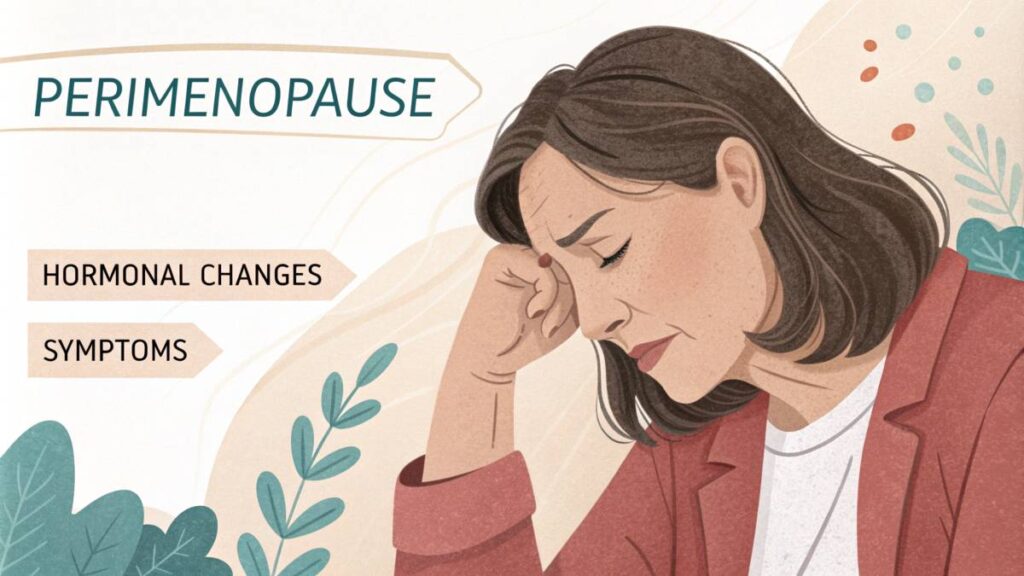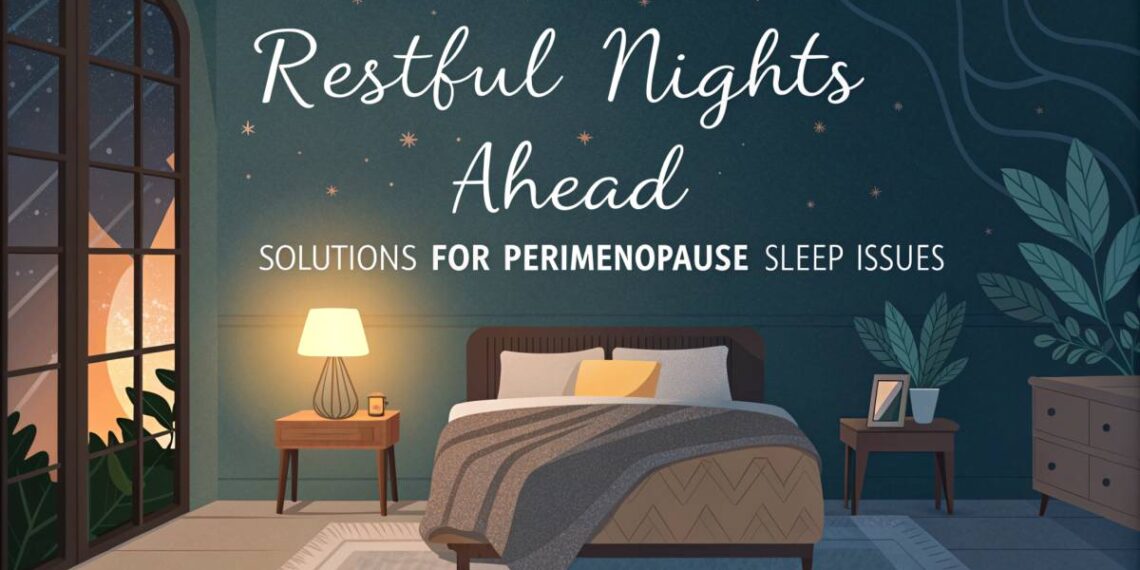Perimenopause often disrupts the balance women rely on for a good night’s rest. During this time, hormonal shifts can cause a host of sleep issues—night sweats, insomnia, and even restless leg syndrome—all of which can leave you feeling drained. But here’s the good news: understanding these changes can help you manage them. Let’s explore practical, evidence-based strategies to keep perimenopausal sleep issues from stealing your rest.
Perimenopause and Sleep
Understanding Perimenopause
Perimenopause, the phase before menopause kicks in, usually starts as early as a woman’s 30s or 40s. During this time, her body begins its hormonal juggling act, leading to fluctuations in estrogen levels. These hormonal gymnastics can throw sleep patterns out of whack.
Knowing the stages of perimenopause matters for spotting those curveballs it throws our way. Symptoms mix it up between women but often play the hits—irregular periods, hot flashes, mood swings, and yep, sleep getting all twisted.

Impact of Perimenopause on Sleep
Lots of women report they’ve got beef with sleep during perimenopause, which isn’t just a minor tick-off; it can mess with how they feel overall. Check out the table below for some sleep issues that might pop up.
| Sleep Issue | What’s Going On |
|---|---|
| Hormonal Fluctuations | Those ever-changing hormones can mess with sleep cycles, making it tough to hit the hay or stay snoozing. |
| Insomnia | Suddenly struggling to get or keep sleep? Blame it on stress vibes or plain ole discomfort. |
| Night Sweats | Those nighttime heat surges mean waking up suddenly, ruining the beauty sleep. |
| Restless Leg Syndrome | An odd sensation in the legs can get some women up and pacing, not sleeping. |
| Sleep Quality | Sure, you slept, but did you really? Hormonal chaos can drag the quality down, leaving you yawning all day. |
The sleep mess during perimenopause can be a real drag, and if you’re nodding along, you’re not alone. A bunch of women find it’s a relief to chat with folks who are also dealing with the same headaches.
Curious about how sleep shifts across life’s stages? Check out pregnancy sleep changes and what to expect with newborn sleep patterns.

Common Sleep Issues During Perimenopause
Ah, perimenopause—a stage of life that brings sleep issues that can knock anyone’s beauty sleep right off the bed. Don’t fret, though. Knowing what’s happening can make things way easier to handle and sort out.
Insomnia
If counting sheep isn’t doing the trick, you might be dealing with insomnia: public enemy number one for the perimenopausal. Tossing, turning, staring at the ceiling—it’s all part of the package. Blame it on those pesky hormones that can’t seem to mind their own business.
| Insomnia Troubles | How Often It Happens (%) |
|---|---|
| Can’t fall asleep | 50% |
| Can’t stay asleep | 60% |
| Up way too early | 40% |
Night Sweats
Getting cozy at night only to wake up in a pool of sweat? Night sweats during perimenopause are like a surprise shower without the spa experience. It’s all due to those estrogen levels playing havoc with your body’s thermostat. Comfort is the word you can only dream of—literally.
| Night Sweat Levels | How Often It Happens (%) |
|---|---|
| Just a bit sweaty | 30% |
| Kinda sweaty | 40% |
| Sweaty like a sauna | 30% |
Restless Leg Syndrome
Got ants in your pants? Nope, it’s just Restless Leg Syndrome making bedtime feel like a long road trip. The legs wanna groove even when you’re ready to snooze, leading to restless nights and sleepy mornings. It’s the guest nobody invited.
| RLS Annoyances | How Often It Happens (%) |
|---|---|
| Gotta move those legs | 25% |
| Legs out of order | 35% |
| Sleep gets all tangled | 40% |
Understanding what’s going on with sleep during perimenopause isn’t just for those in the thick of it—the folks around them might want to know, too. Tackling stuff like insomnia, night sweats, and leg restlessness can make hitting the hay not just a dream. Check out more about snoozing at different life stages by peeping newborn sleep patterns or sleep tips for 30s.
Lifestyle Changes for Better Sleep
Tweaking some daily habits can have a big impact on catching more Z’s, especially if you’re dealing with perimenopause sleep issues. Check out some real, do-able changes you can start right away.
“The importance of routine cannot be overstated; a consistent schedule signals your body that it’s time for rest.” – National Sleep Foundation
Establishing a Bedtime Routine
Getting into a bedtime groove can help your body clue in that it’s time to chill. Think about adding some mellow activities like reading, soaking in a warm tub, or doing some simple relaxation tricks. Try kicking off this wind-down about 30 to 60 minutes before you hit the sack.
| Activity | Suggested Time |
|---|---|
| Reading | 20 mins |
| Warm bath | 15-30 mins |
| Breathing exercises or meditation | 5-10 mins |
Getting into the groove of a nightly routine can smooth out your sleep schedule. Keep away from stuff that keeps your brain buzzing, like screens and caffeine. Wanna know more about handling screen time? Check out our piece on screen time and sleep.
Creating a Relaxing Sleep Environment
Where you sleep can make or break a good night’s rest. Setting up your bedroom as a calm retreat can make hitting the hay a dream. Here’s how to cozy up your crib:
- Lighting: Dim the lights or switch them off before turning in. Blackout curtains can help keep it dark.
- Temperature: A cool room between 60-67°F (15-19°C) helps you snooze better.
- Noise: Block out the night-time ruckus with a white noise machine or a fan, especially if the city’s bustling around you.
| Aspect | Recommendation |
|---|---|
| Lighting | Soft lights, blackout drapes |
| Temperature | 60-67°F (15-19°C) |
| Noise | White noise or fan |
A chill vibe in your room can be a game-changer, particularly if you’re tossing and turning thanks to perimenopause. For more hacks on nodding off the natural way, check out our take on improve sleep naturally.

Managing Stress and Anxiety
Kicking stress and jitters to the curb is a must for good sleep. Mindfulness, a little yoga, or some deep breaths can work wonders on tension. Adding a few relaxation moves to your routine could be just the ticket.
Consider these tips:
- Mindfulness Meditation: Focus on your breath or dive into guided meditations to ease your mind.
- Gentle Yoga or Stretching: Some light movement can relax both body and mind before bed.
| Technique | Suggested Time |
|---|---|
| Mindfulness meditation | 10-15 mins |
| Gentle yoga or stretching | 10-15 mins |
Working these habits into your end-of-day chill time can soften worries and help you get a better night’s sleep. Curious about the ties between sleep and brain power? Catch our article on sleep and cognitive health.
Making these lifestyle tweaks can boost your sleep during those pesky perimenopausal times, promoting better health all around.
Dietary Adjustments
When it comes to catching those Z’s, what you munch on matters, especially if you’re weathering the storm of perimenopause. Making the right food choices can be your secret weapon against those pesky sleep issues.
“Certain foods naturally aid sleep by balancing hormones and calming the body.” – Sleep Health Journal
Foods to Promote Good Sleep
Want to snooze like a baby? Certain yummies can help you drift off into dreamland by boosting relaxation and cranking up melatonin, the sleepytime hormone. Let’s look at what you should be loading your plate with for better sleep.
| Food Vibe | Goodies That Hit the Spot | Sleepy-time Perks |
|---|---|---|
| Complex Carbs | Whole grains, oats, quinoa | Boosts serotonin mood magic |
| Lean Meats | Chicken, turkey, fish | Packed with tryptophan for chill vibes |
| Healthy Oils | Avocados, nuts, seeds | Helps keep hormones on an even keel |
| Sweet Stuff | Cherries, bananas, kiwi | Nature’s little melatonin gifts |
| Green Goods | Spinach, sweet potatoes | Magnesium kisses for your muscles |
Mix these into your meals, especially when the sun goes down, and you might find yourself snoozing better during those pesky perimenopausal nights.

Foods to Avoid Before Bed
On the flip side, some nibbles can keep you up at night like a bad horror flick. Steering clear of these munchies before bedtime can transform your sleep from a nightmare to a sweet dream.
| No-No Nibbles | Yikes Examples | Keep Away Because… |
|---|---|---|
| Caffeine Hits | Coffee, tea, chocolate | Hello insomnia, goodbye sleep! |
| Sweet Attacks | Candy, pastries | Sugar highs lead to bedtime lows |
| Spicy Surprises | Hot peppers, spicy sauces | Heartburn city, population: you |
| Heavy-duty Eats | Fried foods, rich pasta dishes | Like a rock in your stomach |
| Bevvies & Booze | Wine, beer, spirits | Messes with your sleep rhythm |
Avoiding these in your evening hours can make nighttime a lot more peaceful, especially when battling sleep disturbances during perimenopause. For more tricks to snooze better without meds, pop over to our guide on improving sleep naturally.
Exercise and Physical Activity
Sprinkling a bit of physical activity into your daily routine can work wonders for those pesky perimenopause sleep troubles. Not only does exercise give your health a boost, but it’s also your ticket to dreamland.

How Exercise Helps You Snooze Better
Getting active comes with a bonus package of sleep perks:
| Benefit | What’s in it for you? |
|---|---|
| Bye-bye Stress | Breaking a sweat helps knock down cortisol, that trouble-making stress hormone, giving you some well-earned relaxation. |
| Happy Vibes | Those endorphins from working out? They’re like little happiness elves making it easier to drift off. |
| More Zzz’s | Hit the pillow for longer stretches and soak up all that restorative shuteye. |
| Dreamier Sleep | Get ready for the deep, blissful sleep you’ve been dreaming of. |
| Smoother Symptoms | Say goodbye to menopause-related gripes like anxiety and mood swings, paving the way for better nights. |
Exercise Picks for a Good Night’s Sleep
Let’s face it, not all workouts wear the same superhero cape when it comes to sleep. Here’s a menu of activities to tuck you in for the night:
| Type of Exercise | How Long? | How Often? |
|---|---|---|
| Aerobics (walking, swimming, cycling) | 30-60 minutes | 3-5 times a week |
| Pump Up (weights, resistance bands) | 20-30 minutes | 2-3 times a week |
| Yoga and Stretch | 15-30 minutes | 2-3 times a week |
| Chill and Relax | 10-15 minutes | Every day |
If perimenopause is playing games with your sleep, mixing in some moderate-intensity exercises and giving relaxation workouts like yoga a go might just do the trick. They’ll benefit you both physically and mentally. Also, uncovering some sleep tips for 30s might hand you a few more sleep hacks for this rollercoaster of a life stage.
Sleep Hygiene Tips
Getting your snooze environment just right can do wonders for managing perimenopause-related sleep hiccups. Practicing solid sleep habits can elevate both your nights and days.
Cutting Down Screen Time Before Bed
Keeping your eyes off screens before bedtime is a game changer. Gadgets like smartphones, tablets, and laptops spit out blue light, which messes with your body’s sleep rhythms and makes snoozing seem impossible. Keeping screens at bay for at least an hour before hitting the hay can steer you towards dreamland.
| Activity | Recommended Limit |
|---|---|
| Phone Scrolling | Cap it at 30 min |
| TV Binging | Cut off at 1 hour |
| Laptop Work | Just say no |
Curious about how screens meddle with your sleep? Check out our piece on screen time and sleep.
Keeping a Regular Sleep Schedule
Sticking to a sleep schedule can really help folks wrestling with perimenopause sleep struggles. When you hit the sack and rise around the same time daily, it keeps your body clock tick-tocking right, making waking up a breeze, and turning in a cinch.
| Time of Day | Activity |
|---|---|
| 6:00 AM | Rise and shine |
| 8:00 PM | Start winding down |
| 10:00 PM | Lights out |
| 6:30 AM | Greet the new day |
Encouraging constancy in sleep routines is a lifesaver, especially for parents juggling sleep quirks. Peek at our related reads on toddler sleep regression or teenage sleep deprivation for stage-specific advice.
Trying Out Relaxation Tricks
Getting into the zen zone before bed can zap stress and deepen sleep. Activities like practicing deep breathing, meditating, or doing gentle yoga set both mind and body in chill mode for the night.
| Technique | Description |
|---|---|
| Deep Breathing | Breathe in through your nose, out through your mouth slowly. |
| Meditation | Sit in stillness, pondering or honing in on mindfulness. |
| Gentle Yoga | Stretch lightly to ease the body’s tension. |
Explore more on natural sleep enhancers in our Improve Sleep Naturally article. Making relaxation strategies an evening staple can tackle perimenopause sleep snafus head-on.
Seeking a Helping Hand
Perimenopause, with its reputation for turning nights into an exhausting game of “Will I Sleep or Not?”, can be a real doozy. But getting an expert in your corner might just be the ticket you need.
Chatting with Your Doc
If sleep’s acting like an elusive beast that refuses to be tamed during perimenopause, it’s worth having a chinwag with your doc. They’re the folks who can give your symptoms the once over, mull over your nightly habits, and see if anything fishy’s going on. A typical chat might cover:
- Just how bad the sleep shenanigans are, and how often they occur
- A rundown of your medical history and whatever pills you’re popping
- A few tests to make sure sleep apnea or wild hormones aren’t to blame
The wisdom of your healthcare guru might also come with some tricks for tweaking your lifestyle to squeeze out better sleep during this whirlwind phase. For a deeper dig, check out our piece on how sleep ties to brainpower.
Weighing Your Options
Once your doctor’s done the Sherlock thing, they’ll lay out a few options to conquer those perimenopause sleep woes. Your sleep recovery toolkit might include:
| Treatment Pathway | What’s in Store |
|---|---|
| Hormone Balancing (HRT) | Can iron out tricky hormone changes that keep sleep out of reach during perimenopause. |
| Rewiring the Noggin (CBT) | Aims at flipping negative sleep thoughts and habits on their head to enrich sleep quality. |
| Meds Galore | Sleeping pills or mood lifters might be prescribed to tackle sleeplessness or jitteriness that messes with snoozing. |
| Nature’s Offerings | Melatonin, valerian root, and other herbal concoctions might come into play—but check with a doc before diving into these ancient wonders. |
Picking the right path is all about teaming up with a doc well-versed in the chaos that is perimenopause. With their help, you can say goodbye to restless nights and hello to feeling a whole lot more chipper. For tips on handling those sleep gremlins when life moves into different chapters, dive into our reads on pregnancy sleep quirks and geezer sleep struggles.
Support and Connection
When dealing with sleep trouble during perimenopause, leaning on others can make a big difference. Sharing what’s going on and looking for comfort in buddies is like a balm for the soul.
Joining Support Groups
Support groups are like cozy hangouts where folks facing the same stuff come together to chat and swap ideas. These gatherings—whether you find them online or in the local community—offer a chance to sit down and yak about perimenopause and sleep woes.
Hearing other people’s tales often works wonders, making you feel less alone and more understood. Whether it’s battling insomnia or figuring out how to handle those night sweats, support groups cover it all.
| Benefits of Joining Support Groups |
|---|
| Shared experiences make you feel not-so-alone. |
| Lots of ways to tackle problems. |
| Emotional high-fives from folks who get it. |
Sharing Experiences with Others
Talking about personal stories weaves a web of community and empathy. You might find your pals, family, or even colleagues are in the same boat. Chatting about perimenopause and sleep struggles can lift spirits and offer some much-needed recognition.
Discussing these troubles sometimes turns them into less of a burden and more like shared wisdom—advice that only those who’ve been through the wringer can give. Coming up with solutions together or just lending an ear builds stronger bonds and keeps that support flowing.
Seeking Comfort from Loved Ones
Having family and friends who are ready to step in is gold during perimenopause. They can provide much-needed hugs and understanding through little gestures—talking things out, tagging along to doctor visits, or tweaking the bedroom for better snoozing.
Relying on loved ones can ease the stress that sleep issues bring. Plus, they remind you you’re in this together. Get them involved with relaxing routines like meditation or yoga, benefiting everyone.
A solid community base and tight-knit relationships are like secret weapons in tackling perimenopause sleep hiccups. These connections build up strength and offer peace during a bumpy ride. To dive deeper into sleep challenges through life’s chapters, check out topics like sleep tips for 30s and senior sleep apnea.
Conclusion
While perimenopause can be a challenging phase, understanding how it impacts sleep gives you the tools to manage these changes. With lifestyle adjustments like a consistent bedtime routine, creating a calming sleep environment, dietary modifications, and regular exercise, you can improve both the quantity and quality of your rest. Seeking support, whether from loved ones or support groups, can also ease the journey. Armed with these strategies, restful nights are within reach, even during this hormonal transition.
FAQs
What is perimenopause, and how does it affect sleep?
Perimenopause is the period leading up to menopause, characterized by hormonal fluctuations that can disrupt sleep. Common symptoms include night sweats, insomnia, and restless leg syndrome.
How can I create a sleep-friendly environment during perimenopause?
A cool, dark room with a set sleep routine can improve sleep. Use blackout curtains, maintain a cool temperature (60-67°F), and avoid screens before bed.
Are there specific foods that promote better sleep during perimenopause?
Yes, foods rich in tryptophan (like turkey and nuts), magnesium (like leafy greens), and complex carbs can help improve sleep quality by promoting relaxation.
Can exercise improve perimenopausal sleep issues?
Moderate exercise, such as walking, yoga, or stretching, can reduce stress and boost endorphins, helping you fall asleep faster and enjoy deeper rest.
Is hormone replacement therapy (HRT) effective for perimenopausal sleep issues?
HRT may help balance hormones, reducing symptoms like hot flashes and night sweats that interrupt sleep. Consult your doctor to explore if this option is right for you.








